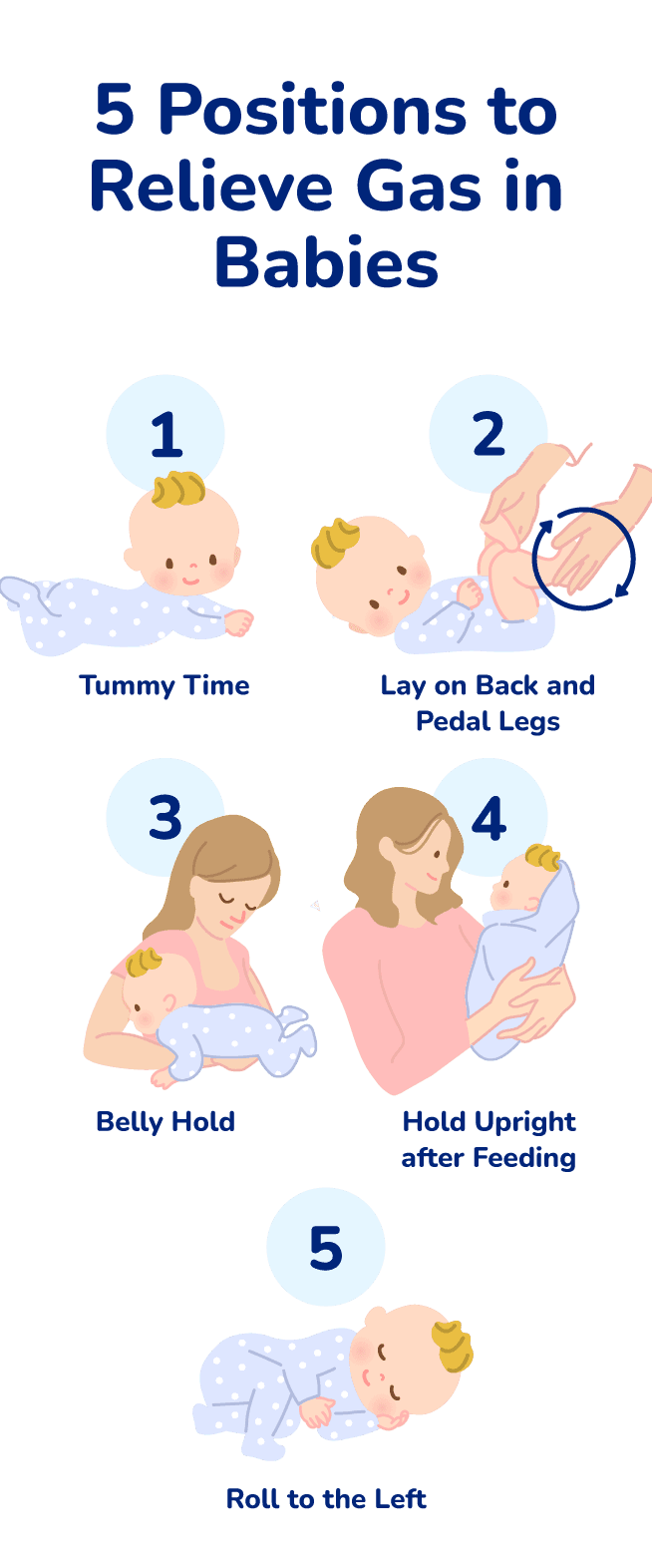
Little ones can have some not-so-little bouts of gas. These positions may help them feel better.
Baby gas is a typical (and a bit of a stinky) issue. And while burps and flatulence are to be expected, when those air bubbles in the stomach and intestines build up, they can be uncomfortable for your little one. While burping is often the initial gas-relief go-to, the following five positions may also help ease your gassy newborn’s discomfort and fussiness.

Tummy time, supervised sessions when you lay your baby on their stomach while they are awake, has several benefits. It helps build their core strength and head control and can also promote gas release. The stretching and abdominal pressure give them a belly massage that can help break up gas bubbles. Place a toy or two around your baby to encourage them to reach and wiggle.
Place your baby on their back, and gently move their legs like they’re in a mini spin class. This bicycling motion can encourage stubborn gas to pass. Stop every once in a while and gently press both of your baby’s knees toward the belly.
The belly hold, also known as the forearm or football hold, may provide some newborn gas relief. Hold your baby securely face down with your hand under their tummy and their head cradled on your forearm. Gently bounce and rock your little one or massage their back. You can also switch the baby’s position, so their head rests in your hand.
If your baby is prone to gas, try keeping them upright for about 30 minutes after eating, with their body straight, not seated. Avoid placing your infant on their back right after feeding.
Carefully roll your baby onto their left side while they are in your arms and stroke their back to promote calmness. If your baby falls asleep, place them on their back in their crib as soon as possible. For safety reasons, babies up to one year old should always sleep on their back on a flat, firm surface free from toys, pillows, and loose bedding and blankets.
Some positions may work better than others for your little one, and you may have to alternate strategies. Be patient and take it slow as you work to find the ideal positions to help relieve your baby’s gas. If your baby continues to struggle with gas and fussiness, or they are not gaining weight or are experiencing additional issues such as reflux, diarrhea, or white, red, or black colored stool, speak with your pediatrician.
While some babies are unfazed by gas—and may even seemingly smile when passing it—others may experience gas-related discomforts. In addition to the expected burps and flatulence, the following could indicate a particularly gassy baby.
Gas can be uncomfortable, and your baby may communicate their distress through crying and fussiness.
If your baby cries excessively and inconsolably for three or more hours a day, more than three days a week, for over three weeks—and is not hungry, tired, or sick—they could have colic. Gas is a potential colic trigger, but not the only one. Reach out to your doctor, who can help identify what could be making your baby so irritable.
Infants can have a bloated, hard belly when they swallow too much air while eating.
A baby’s tiny tummy fills up fast. If your little one is gulping breast milk or infant formula very quickly, they may not only swallow air which can cause gas, but they may also spit up.
A gassy baby may draw their legs up to their chest, grunt, squirm, and act grumpy and unhappy.
The lack of movement during sleep can trap gas.
There are several reasons why your baby may be experiencing gas:
The good news is that often the gas itself is not harmful, and babies typically outgrow the excessively gassy stage as their digestive system develops. Learn more about fussiness and gas in babies.
If you’re feeding your baby formula, talk to your pediatrician about switching to Enfamil NeuroPro Gentlease Infant Formula. It provides a gentle start for sensitive tummies and is designed to ease fussiness, gas, and crying in 24 hours
And no matter what type of Enfamil formula you choose, you can start receiving up to $400 in savings, exclusive rewards, and support by joining Enfamil Family Beginnings. Enjoy a variety of benefits, including discount checks and digital rebates on Enfamil products. You may also be eligible for free samples.
All information on Enfamil, including but not limited to information about health, medical conditions, and nutrition, is intended for your general knowledge and is not a substitute for a healthcare professional's medical identification, advice, or management for specific medical conditions. You should seek medical care and consult your doctor or pediatrician for any specific health or nutrition issues. Never disregard professional medical advice or delay seeking medical treatment, care, or help because of information you have read on Enfamil.